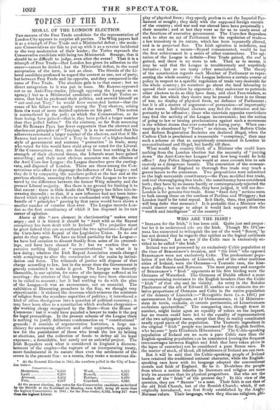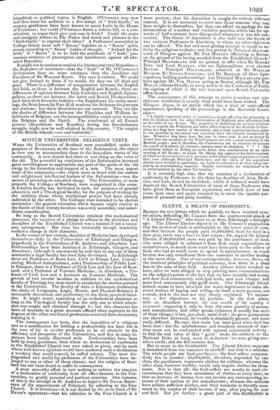WHO ARE THE IRISH ?
"IRELAND for the Irish," it has been said. Quite just and proper: but let it be understood who are the Irish. Though Mr. O'CON NELL has consented to relinquish the use of the word " Saxon," he has not denied that he regards that epithet as the logical antithesis to " Irishman." Let us see if the Celtic race is exclusively en- titled to be called " the Irish."
Ireland was not possessed by an exclusively Celtic population at the time of STRONGBOW'S invasion, and " the Irish " who opposed STRONGBOW were not exclusively Celts. The predominant popu- lation if not the founders of Limerick, and of the other maritime cities of Ireland, were the Ostmans—a Teutonic race, the kins- men of the Saxons and Normans. The most prompt and energetic of STRONGBOW'S " Irish " opponents at his first landing were the Ostmans of Waterford. The Ostmans of Dublin offered a more uncompromising resistance to the English invaders than the Celtic "Irish" of that city and its vicinity. An entry in the Rotulus Placitorum of the 4th of Edward IL enables us to estimate the re- lative proportions of Ostmans and Celts in the native population of the deanery of Limerick :—"Recognitio facta (A. D. 1201) per sacramentum 12 Anglorum, et 12 Ostmannorum, at 12 Hibernen- slum de terris, ecclesiis, et creteris pertinentiis, ad Limericensem ecclesiam spectantibus." The conquering race, though fewer in number, might insist upon an equality of voices on the inquest, but no reason could have led to the equality of representatives of the two subjugated races, except that they in reality constituted nearly equal parts of the population. The Teutonic ingredient in the original " Irish " people was increased by the English families, who became" ipsis Hibernicis Hiberniores." The Celtic-speaking population of Ireland are no more a pure Celtic race than the English-speaking population can be considered (seeing the frequent intermarriages between English and Irish that have taken place in the lapse of centuries) can be considered a pure Saxon race. Iw the matter of stock, of blood, all inhabitants of Ireland are one race. But it will be said that the Celtic-speaking people of Ireland have retained the traditional national character, while the English- speaking race have with its language adopted the conventional morals and faith of England. So be it. Doubtless the people from whom a nation inherits its literature and religion are more truly its ancestors than its physical progenitors. But who are the leaders of the " Irish" of the present day ? In this view of the question, they are " Saxons" to a man. Their faith is not that of the old Irish Church, but of the Romish Church; which, if not originally introduced, was first firmly established by the Anglo:- Norman rulers. Their language, when they discuss religious, phi- losophical, or political topics, is English. O'CONNELL may now and then treat his auditors to a few scraps of " Irish Gaelic," as country gentlemen have been known to quote Latin in the House of Commons; but could O'CONNELL frame a reform-bill, or a con- stitution, or argue their pros and cons in Irish ? Could the acute and energetic writers in The 21Tation find words and phrases in the " Irish Gaelic " to express their ideas ? A Parliament assembled in College Green must talk " Saxon," legislate in a " Saxon" spirit, reason according to " Saxon" habits of thought. " Ireland for the Irish," if " Saxon " is to be held the antithesis of " Irish," pro- nounces sentence of proscription and banishment against all edu- cated Repealers. It might not be useless to remind the literary and rural Repealers- the Repealers of sentiment—that the "Irish" of Mr. O'CONNELL'S declamation have no more existence than the Jacobites and Cavaliers of Sir WALTER SCOTT. The race is extinct. We could not give Ireland to them if we would, for they are all dead and gone. There is a difference of temperament between the English and Irish, as there is between the English and Scotch ; there are differences of opinion between Irish Catholics and English Episco- palians, as there are between the latter and Scotch Presbyterians ; each have their favourite hobbies—the Englishman his vestry meet- ings, the Scotchman his Free Kirk sessions, the Irishman his patterns and stations : but these diversities are not national. They are like the shades of difference between the Flandrian and Walloon in- habitants of Belgium, not the incompatibilities which exist between the Belgians and the Dutch. The watchword of all French patriots (Republican and Royalist) during the Revolutionary struggle, might now be well adopted in this country, " The empire of the British Islands—one and indivisible."



























 Previous page
Previous page